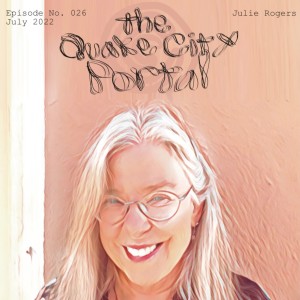
Thursday Jul 28, 2022
QCP #026| Julie Rodgers, Buddhist Practitioner and Founder of TLC | Preparing for the End of Life, Working with Grief, and Dharma
GUEST BIO
Julie Rogers is the Founder and Director of TLC Transitional Life Care, a Vajrayana Buddhist non-profit organization dedicated to the education and support of individuals and their families during the end-of-life transition. This program is centered in the SF Bay Area and southern Oregon, and is available online and via Zoom. She is a writer, author, mother, educator, and administrator, and has been a caregiver and hospice volunteer, as well as a Vajrayana (Tibetan) Buddhist for almost 40 years.
Over twenty-five years ago, Julie was surrounded by a string of deaths. These were the deaths of her friends, many only in their thirties at the time. Years later, she experienced the death of her husband. The close succession of some of these deaths compelled her to ask why there wasn’t much information available to address the needs of families and individuals dealing with death.
With encouragement from her Buddhist teacher, Venerable Gyatrul Rinpoche, Julie Rogers later founded TLC Transitional Life Care in 2014. Years earlier, she had written a concise instructional manual about preparing for the moment that will eventually come for all of us – Instructions for the Transitional State, published by Vimala Treasures. To summarize, it aims to offer guidance through the dying process from a Buddhist perspective, but is intended for those of any persuasion. It also includes information about working with the secular aspects of documentation and paperwork, things that families are too often burdened with while in the process of grieving, but it’s focus is on how to offer compassionate care to the person dying. A checklist showing how to properly care for those who are dying is provided, as well as supportive material about how to hold space during the transition of a loved one, or anyone. In other words, the manual is condensed with valuable information that we often overlook until it’s too late.
So, since death is an inevitable part of life that causes us to picture the worst of our fears to the point we bottle them up until the very last moment, is there not anything we can do to help prepare ourselves for when that time does come? Is there anything we can do better to help each other grieve and process loss rather than avoid it altogether?
We hope that conversations like this bring us closer to acceptance, and encourage us to feel less resistance when we do eventually transition out of our bodies and into whatever you believe is waiting to greet us in the afterlife.
In speaking with Julie, she helped impart in me an affirmation of a belief that we can never be grateful enough. And to show that gratitude by giving and giving truthfully in alignment with our beliefs.
I suggest listening to this episode with a loved one and encourage you to have conversations around the topic of death so that grief becomes less taboo, less of a thing to avoid in each other. And in doing so, we can help each other, in the words of the late Ram Dass, “walk each other home.”
Please enjoy this conversation with Julie Rogers.
- ESSENTIAL LINKS
NOTES FROM THE SHOW
- SEG 1
- inner work
- Tashi Choling Center
- Friends Passed of Cancer in their 30s in span of 2 years
- ORGYEN DORJE DEN
- Gaytrul Rinpoche
- Elizabeth Kubler Ross
- Instructions for the Transitional state
- Alternative Interment
- green burial
- Ed Bixby
- Seth Vidal
- Catholicism and Buddhism
- Bodhicitta
- SEG 2
- How do we allow space for others to grow, while spreading awareness and raising consciousness
- Meeting a Guru
- Mount Shasta
- Phowa
- Natural Liberation – Book by Padmasambhava
- SEG 3
- Ritual Burial
- Rosek and Ka
- Youth Centric Culture
- Ageism
- Different Forms of Self Care
- helping others through grief
- SEG 4
- Managing Relationships
- David Meltzer
- Marriage as a path to spiritual work
- Differences between a meditator and someone that studies Buddhism with A guru
- Practicing with intent to serve others
- What is a dignified death?
No comments yet. Be the first to say something!